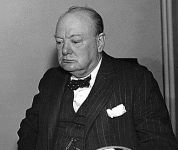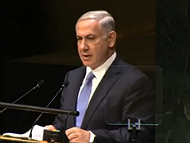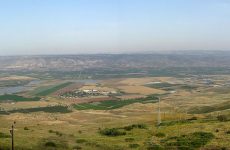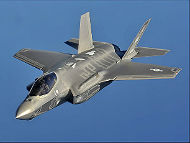
In a rare interview, the outgoing commander of Israel’s Air Force, Gen. Amir Eshel has taken some of the wraps off Israel’s air power. Interviewed on Channel 2 TV by Ronny Daniel, Eshel left no doubt that although the world powers have signed an agreement with Iran limiting its nuclear weapons program, Israel is closely monitoring the situation – if Iran breaks out for A-bombs the Israel Air Force will be ready, willing and able. Gen. Eshel described it this way:
‘We can’t wake up one morning and say oops, the Iranians have surprised us! Our air strike capability (on Iran) is all set to go we just have to take it out of the tool box!’
The following is part of the wide-ranging interview that also sent a sharp stark warning to Lebanon if Hezbollah again bombards Israel with its more than one hundred thousand rockets.
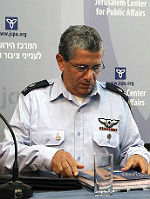
Question: IDF Chief of Staff (Gadi Eizenkot) has called Hezbollah the closest significant threat to Israel. Will the next war with Lebanon be fought differently? (Last war was in 2006).
Gen Eshel: ‘The Israel Air Force will operate over Lebanon – all Lebanon will feel the IAF simultaneously in the north, Beirut, the Bekaa Valley and in southern Lebanon. We intend to act very powerfully on the terror infrastructures from the first moment’.Question: IDF Chief of Staff (Gadi Eizenkot) has called Hezbollah the closest significant threat to Israel. Will the next war with Lebanon be fought differently? (Last war was in 2006).
Interviewed in an IAF hangar with a new F-35 parked in the background, Eshel pointed to the latest addition saying: ‘This aircraft is capable of attacking twenty targets simultaneously – the pilot just presses a button’.
Question: This is a capability that was non-existent in the last Lebanon war?
Eshel: ‘Not to this extent. We are world leaders when it comes to air defense. It is an all Israeli blue and white multi–layer system. It’s not hermetic, it can’t take out everything. There is no such defense system in the world’
Hezbollah chief Sheik Hassan Nasrallah warns Israel just about every week that he has amassed enough rockets and missiles in southern Lebanon to wreak immense damage on the Israeli Air force as well as Israeli civilians. So Daniel asked Eshel if the IAF will be deployed mainly to defend strategic targets rather than civilians.
Eshel: ‘Israeli civilians are defended better today than any other people in the world. But we can’t supply a hermetic defense. This is impossible. It is out of the realm of logic. But our offensive capability must also be taken into the calculation. If we combine the two, the result is we are a world class leader. We are also the leader in the operation of pilotless aircraft from afar. The Middle East is changing and this stretches the capabilities of the IAF. We operate constantly in five different arenas. I’m glad most of these operations are unknown. I also think it’s best they be kept out of the public’s eye. The IAF is a potent force – what I would call a ‘very, very strong hammer’, but in this changing Middle East we have surprised ourselves by becoming not only a powerful hammer but a surgeon’s scalpel – one that operates silently, removes the threat and then moves elsewhere’.
Daniel: In the office of the IAF commander there are many closed bottles (apparently champagne) and each is labeled with the date and the code name for a successful secret air operation commanded by Eshel.
Eshel: ‘We are world leaders in our air effectiveness and attack capabilities. We are capable of conducting attacks on thousands of targets within a twenty-four hour period – relevant and unique targets – second only to the US.
Another thing; the IAF is also a world leader in close coordination with ground forces. I do not know of another air force in the world, and that includes the air wing of the US Marines which is the most integrated force in the world, that can drop one-ton bombs, sometimes at a distance of only one hundred meters, from its ground forces and hit enemy fighters who are attacking your troops without harming any of your own guys.
I cannot guarantee there will not be war. But we are distancing war if Israel’s enemies understand that we know much more about them than they ever thought possible. I assume that some of our operations are reported to Nasrallah. Whoever has eyes is his head (Nasrallah) must stop and think how did they know this about us? How were they (Israeli pilots) able to carry out that air strike?’
And here the IAF commander stressed:
‘It is not only the operational capability. It also demonstrates the capability of knowing when and where to attack precisely time after time. It sends a very effective message to the enemy. That is the second thing they see. The third thing is they see is that the State of Israel is determined to act when its security interests are at stake. We have been able to insert fighter planes into combined operations on the ground as part of IDF tactics. There are things that only heavy bombs can do – to attack underground tunnels sometimes tens of meters below the surface. We know how to do it and are developing these tactics further. We are in charge of the brunt of Israel’s power. If we act incorrectly or if we act when it is not necessary there may be severe long term consequences. Therefore this requires responsibility, both on the strategic and tactical levels’.
Gen. Eshel was asked where he stood in the former debate between Prime Minister Netanyahu and Former Defense Minister Ehud Barak on whether to go it alone by conducting a pre-emptive air strike against Iran’s nuclear facilities before the international agreement that was reached in 2015.
Eshel: ‘The IDF made its position crystal clear to the political echelon at that time. Those were closed discussions and will remain closed as far as I am concerned. We presented our position without holding back anything. We have built capabilities and these capabilities are not theoretical, they are practical capabilities. Our responsibility (of IDF), is to convey to the political echelon what we think as those who understand the consequences of activating these capabilities. But it is the political leaders who make the decisions. The tools we developed and the methods – if you combine all these factors with excellent intelligence, the capability of an effective very powerful preemptive strike has been returned to the toolbox that the state of Israel can use’.
Daniel: You talk as if war could be just around the corner:
Eshel: ‘A preemptive strike? Yes, wars in the Middle East can happen sometimes by mistake – even when no one wants it. One side says it does not want war the other side also says it doesn’t want it either, but war breaks out anyway. We cannot wake up one morning and say oops, we’re not prepared sufficiently. Certainly not the IAF which is the swiftest, the most prepared, most flexible and immediately available force in the IDF.
Israel’s military power, the blows we have inflicted on our enemies have created a powerful deterrent, but it is not total. And every time they get a reminder, I don’t believe this whets their appetite for another round. But can war suddenly break out? The answer is yes, and therefore, we must be prepared’.


